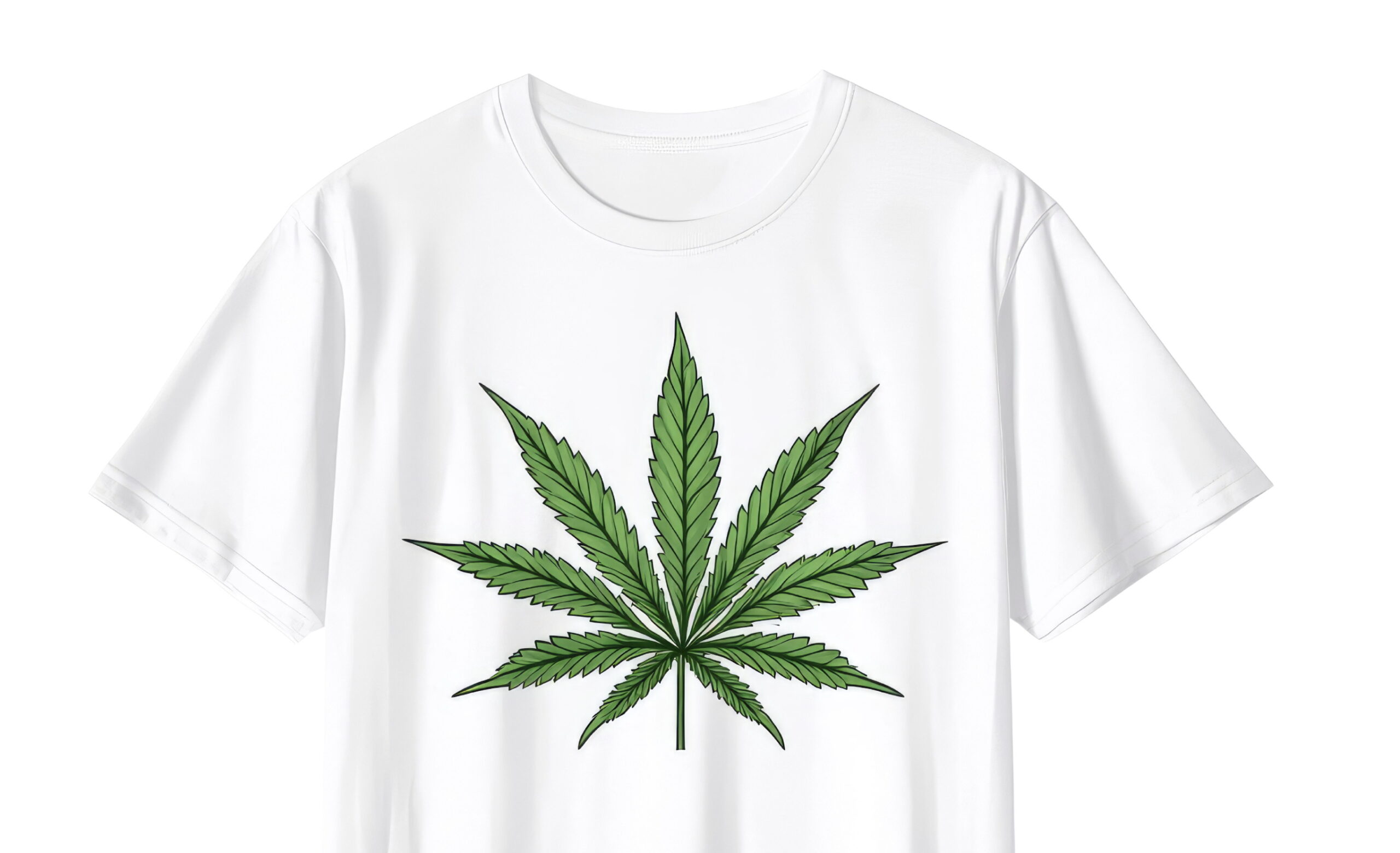For decades, cotton and cotton-polyester mix T-shirts have been a mainstay of decorated apparel world. However, more recently, a formidable and sustainable challenger is making waves: hemp. As consumers become more environmentally conscious, the demand for sustainable products is surging. For custom decorated apparel businesses, this shift represents a significant opportunity. Offering hemp T-shirts can align your brand with the values of sustainability and quality, creating a powerful marketing message.
As evidence of this trend, look no further than companies like the Toasty Hemp Co. (toastyhempco.com), which offers a wide range of hemp-poly blend T-shirts, and Los Angeles-based Jacaranda Hemp (jacarandahemp.com).
From Field to Fabric: Producing an Eco-Friendly Hemp T-shirt
The process of creating a hemp T-shirt is a testament to sustainable innovation, blending age-old agricultural practices with modern textile technology. It all starts with the industrial hemp plant, a remarkably versatile and resilient crop.
- Cultivation: Hemp is a fast-growing plant that requires significantly less water than conventional cotton and typically needs no pesticides or herbicides to thrive. As it grows, it naturally regenerates the soil and absorbs large amounts of carbon dioxide, making it an environmental powerhouse from the very beginning.
- Harvesting and Retting: Once mature, the hemp stalks are harvested. The next step is “retting,” a process where moisture and microbes break down the compounds that bind the fibers together. This can be done naturally in the field (dew retting) or in water, separating the tough outer core from the soft inner fibers.
- Fiber Separation and Softening: After retting, the stalks are broken apart to separate the long, durable fibers from the woody core. These raw fibers, which can be coarse initially, are then softened through mechanical or enzyme-based processes to prepare them for spinning.
- Spinning and Weaving: The softened hemp fibers are spun into yarn. This yarn is often blended with other materials, such as organic cotton or recycled polyester, to enhance softness and specific performance characteristics. The yarn is then woven or knitted into the fabric that will become a T-shirt.
- Manufacturing: Finally, the finished hemp fabric is sent to manufacturers, often in local production hubs like the Los Angeles Fashion District. Here, it is cut, sewn, and finished into the final T-shirt, ready to be worn and loved.
This entire “seed to stitch” process, when kept local, especially, dramatically reduces the carbon footprint associated with transportation and ensures greater oversight of ethical and sustainable practices.
Comfort Advantage: Why Hemp T-shirts Feel Great, Too!
When people think of hemp, “softness” might not be the first word that comes to mind. However, modern processing techniques have transformed hemp into a fabric that rivals luxury materials in comfort.
Hemp T-shirts offer a unique combination of qualities that make them exceptionally comfortable to wear:
- Breathability: Hemp fibers are hollow, which allows air to circulate freely. This natural ventilation helps regulate body temperature, keeping you cool in the heat and warm in the cold.
- Durability and Softness: One of the most remarkable properties of hemp is that it gets softer with each wash, without losing its strength. Unlike cotton, which can wear out over time, hemp T-shirts “wear in,” becoming more comfortable and personalized with age.
- Moisture-Wicking and Antimicrobial: Hemp fabric is naturally resistant to bacteria and mold. It also wicks moisture away from the skin, keeping you dry and fresh throughout the day. This makes hemp tees an excellent choice for activewear or as a base layer.
- Hypoallergenic: Because hemp is grown without harsh chemicals, it is an excellent choice for people with sensitive skin. The natural, chemical-free fabric reduces the risk of irritation.
Brands like Toasty Hemp Co. have built their identity around this functional comfort, offering various fits from “Sport” to “Relaxed” that showcase the versatility and wearability of modern hemp apparel.
Sustainability: Hemp’s Green/Eco-friendly Credentials
The fashion industry is one of the world’s largest polluters, but hemp offers a clear path toward a more sustainable future. The environmental benefits of choosing hemp over conventional cotton are substantial and well-documented.
- Reduced Water Consumption: By some estimates, hemp requires about 50 percent less water per season than conventionally grown cotton. In water-scarce regions, this difference is critical for conserving precious natural resources.
- Little Need for Pesticides: Hemp is naturally resistant to pests, eliminating the need for the toxic pesticides and herbicides that are heavily used in cotton farming. This protects local ecosystems, farmworkers, and consumers from chemical exposure.
- Soil Regeneration: Hemp’s deep root system helps prevent soil erosion and returns vital nutrients to the ground, improving soil health for future crops. This regenerative quality makes it a key player in sustainable agriculture.
- Biodegradability: At the end of its long life, a 100-percent hemp T-shirt, especially, is fully biodegradable. Garments made from natural hemp fibers can return to the earth, leaving no harmful microplastics or chemical residues behind.
- Carbon Sequestration: Industrial hemp is incredibly effective at capturing carbon dioxide from the atmosphere—more so than many forests. This makes hemp cultivation a powerful tool in the fight against climate change.
By producing and selling hemp T-shirts, your business can directly contribute to a healthier planet and offer a product that aligns with the growing demand for environmental responsibility.
Hemp’s Marketing Edge: Selling a Story of Sustainability, one T-shirt at a Time
In a crowded marketplace, a strong brand story is essential. Offering hemp T-shirts provides a compelling narrative that resonates with today’s conscious consumer. It’s an opportunity to market more than just a product; you’re marketing a commitment to quality, ethics, and sustainability. To better leverage hemp for marketing success:
- Educate Your Customers: Many consumers are still unfamiliar with the benefits of hemp fabric. Use your marketing channels to share the story of how hemp is grown, its environmental advantages, and its superior comfort. Blog posts, social media content, and product descriptions can all serve as educational platforms.
- Highlight Your Values: By choosing hemp, you are signaling to your audience that your brand values sustainability and ethical production. This builds trust and fosters a deeper connection with customers who share these values. Jacaranda Hemp, for instance, donates 3% of its profits to an environmental nonprofit, reinforcing its commitment to the planet.
- Showcase Quality and Durability: Position your hemp T-shirts as a long-term investment. Emphasize that they are made to last, getting better with every wear. This counters the narrative of fast fashion and appeals to consumers looking for durable, timeless pieces.
- Create a Community: Build a community around your brand’s mission. Encourage customers to share their experiences with your hemp products and engage them in conversations about sustainable living. This creates brand ambassadors and strengthens customer loyalty.
A Better Choice for Your Decorated Apparel Business…and the World as a Whole
Switching to hemp T-shirts is a strategic move that offers benefits across the board. For your customers, it provides a superior product that is comfortable, durable, and healthy to wear. For your business, it offers a powerful marketing narrative that builds brand loyalty and meets the growing demand for sustainable goods. And for the planet, it represents a meaningful step toward a more responsible and regenerative apparel industry.
By embracing hemp, you are not just selling a T-shirt. You are offering a solution—a piece of clothing that embodies a commitment to a better future.





